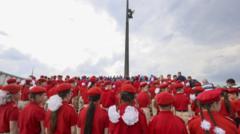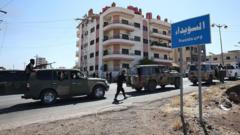Over 250 Venezuelan migrants returned to their home country after enduring alleged torture and mistreatment in El Salvador’s CECOT prison. The Venezuelan Attorney General has called for international inquiries into the situation.
Venezuela Investigates Allegations of Torture Against Deported Migrants in El Salvador

Venezuela Investigates Allegations of Torture Against Deported Migrants in El Salvador
Venezuelan authorities launch an investigation following claims of severe human rights abuses in El Salvador's CECOT prison, where deported migrants faced horrific conditions.
Article text: Venezuela has initiated an investigation into alarming allegations of systemic torture of deported migrants housed in El Salvador's CECOT prison. The claims surfaced following the repatriation of over 250 Venezuelans to near Caracas on Friday. These individuals had been held in El Salvador since March, having been deported from the United States.
Venezuelan Attorney General Tarek William Saab has publicly decried what he termed "systemic torture" occurring within the prison, citing instances of severe physical mistreatment, sexual abuse, and the provision of decayed food. Despite these serious accusations, the El Salvador government has yet to respond.
During a press briefing, Saab presented disturbing testimonies and photographs purportedly depicting detainees suffering visible injuries, including bruises and missing teeth. These accounts, however, have not been independently verified by international news outlets like the BBC. Venezuela's investigation will also target key figures including El Salvador's President Nayib Bukele, Justice Minister Gustavo Villatoro, and Prisons Chief Osiris Luna Meza, urging the International Criminal Court (ICC) and the UN Human Rights Council to conduct their own inquiries.
Notably, Venezuela itself is currently under an ICC investigation regarding similar claims of torturous practices and denial of legal access to prisoners. The deported Venezuelans were returned under the US's 1798 Alien Enemies Act, which allows the President to detain and deport individuals identified as threats without standard legal procedures. Many of these deported migrants were labeled gang affiliates, accusations that their families and legal representatives dispute.
The deportees spent time in the notorious Terrorism Confinement Center, originally established for gang members, without access to legal assistance or their families. Their fate drew international condemnation, especially illustrated by photos issued by Bukele's administration showing the men arriving handcuffed and bald.
These individuals were eventually released in July, following negotiations that exchanged them for US citizens held in Venezuela. A senior official from the Trump administration expressed profound appreciation to Bukele for enabling this exchange. As tensions rise, the situation underscores a fraught relationship between the US, Venezuela, and El Salvador, further complicated by recent US sanctions imposed on the Venezuelan government and a Supreme Court ruling affecting the legal status of hundreds of thousands of Venezuelans in the United States.
Venezuelan Attorney General Tarek William Saab has publicly decried what he termed "systemic torture" occurring within the prison, citing instances of severe physical mistreatment, sexual abuse, and the provision of decayed food. Despite these serious accusations, the El Salvador government has yet to respond.
During a press briefing, Saab presented disturbing testimonies and photographs purportedly depicting detainees suffering visible injuries, including bruises and missing teeth. These accounts, however, have not been independently verified by international news outlets like the BBC. Venezuela's investigation will also target key figures including El Salvador's President Nayib Bukele, Justice Minister Gustavo Villatoro, and Prisons Chief Osiris Luna Meza, urging the International Criminal Court (ICC) and the UN Human Rights Council to conduct their own inquiries.
Notably, Venezuela itself is currently under an ICC investigation regarding similar claims of torturous practices and denial of legal access to prisoners. The deported Venezuelans were returned under the US's 1798 Alien Enemies Act, which allows the President to detain and deport individuals identified as threats without standard legal procedures. Many of these deported migrants were labeled gang affiliates, accusations that their families and legal representatives dispute.
The deportees spent time in the notorious Terrorism Confinement Center, originally established for gang members, without access to legal assistance or their families. Their fate drew international condemnation, especially illustrated by photos issued by Bukele's administration showing the men arriving handcuffed and bald.
These individuals were eventually released in July, following negotiations that exchanged them for US citizens held in Venezuela. A senior official from the Trump administration expressed profound appreciation to Bukele for enabling this exchange. As tensions rise, the situation underscores a fraught relationship between the US, Venezuela, and El Salvador, further complicated by recent US sanctions imposed on the Venezuelan government and a Supreme Court ruling affecting the legal status of hundreds of thousands of Venezuelans in the United States.




















